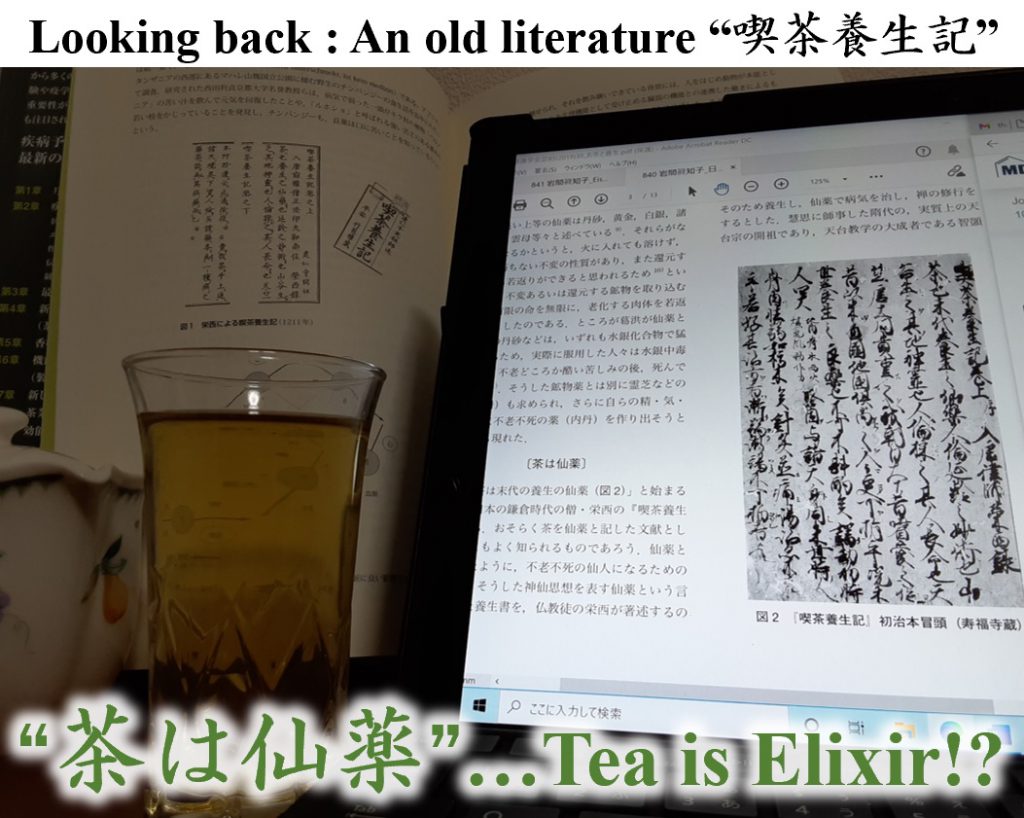Sharing a brief translation of an interesting article[840] about the description about health care mentioned in the old book “Kissa Yojoki” (Notes on Tea and Health Care) written by a Buddhism monk “Eisai”, as follows.
Eisai is an esoteric Buddhism monk who brought tea seeds from China to Japan. He wrote “Kissa Yojoki”, which literally means “Notes on Tea and Health Care” one of the oldest masterpieces of Japanese tea written in 1215.
The great book starts with a wonderful phrase “Tea is the elixir “Senyaku” for the longevity over the ages.” The book is the most famous as the literature describing “tea is an elixir” worldwide. The “Senyaku” elixir is the medicine for being hermit with longevity. It is somehow strange that Buddhist monk Eisai described “Senyaku” elixir, which indicates Shenxian thought.
Eisai, the author of “Notes on Tea and Health Care”, had brought Zen Buddhism to Japan for the first time, written in popular history textbooks in Japan. However, he was originally the monk of Tendai sect trained on the Mt. Hieizan.
“Huisi”, the 2nd founder of Tiantai sect (the origin of Tendai sect in China), wrote the following in his literary work “The Vow Established by the Great Dhyana Master Huisi from Southern Peak”
“To master Buddhism requires the longevity. Thus, I had practiced Zen training with health care and mediation by using “Senyaku” elixir.”
Zhiyi, the substantial founder of Tiantai Buddhism, put his significance on mediation and medicines and wrote the detail in his literatures.
Keiichi OHIRA explains about the description in his literatures as follows.
“The book written by Zhiyi described that it is necessary for the basis of Zen mental training to establish healthy body built by sufficient diet, sleep, exercise and the calisthenics & stretching with proper breathing and sophisticated smooth breathing. (…) The book told us how Zen monks pay their attention to their own health.”
Besides, another Buddhism scholar described that Tiantai textbook “Mohe Zhiguan” is the guidebook for the Zen ritual “Zazen”.
Thus, Tiantai Buddhists had recognition of “health care”, “Senyaku Elixir” and “Zazen”, however, their literatures have never described “tea is elixir”.
Eisai wrote that his purpose of “Kissa Yojoki (Notes on Tea and Health Care)” is the salvation of Japan’s society at the era, when the social disruption because of domestic war “Genpei war” and infectious diseases threatened livelihoods and wellbeing of people. His literature explained that health care is required for the purpose of saving lives. Caring own heart is the most important among health care of 5 organs (heart, stomach, intestine, lung, liver) and the heart likes “bitterness”, which is difficult to intake from ordinary meals. Thus drinking tea, which contains rich bitterness, could improve heart’s health, resulting in preventing various diseases.
Another Buddhism scholar Dr. Endo mentioned that Eisai’s explanation is different from the basic theory at that era in terms of the significance on tea, which means Eisai recognized the special significance of tea.
The later part of “Kissa Yojoki” describes “Medicine have single effect specific to each disease, on the other hand, tea is efficient for all diseases”. And his other literature describes “All diseases are derived from the heart. The best healthy condition of heart prevents all diseases”
His motivation could be the salvation of ruined society at that time (form the end of Heian to the beginning of Kamakura) by distributing tea with Zen among Samurai warriors for their mental and physical health, the author Iwama speculates.
The great efforts of Eisai could enhanced the distribution of tea cultivation and Zen, resulting in “Cha-Zen Ichimi” the mixture of tea culture and Zen ritual, which is the origin of “Chanoyu” tea ceremony.
< Reference >
[840] Iwama M. (2019) : Tea and Health Care, Japanese Journal of Health and Human Ecology, 85:30-42.
P.S.
Dr. Iwama is a cultural scholar working at Tea Museum Shizuoka.

